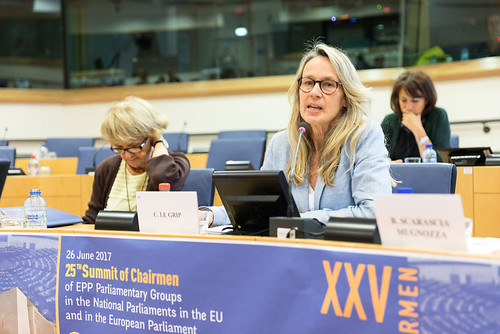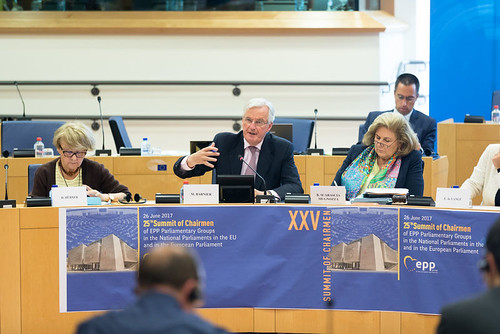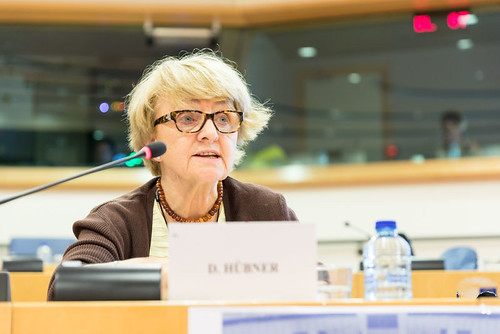Brexit Negotiations: No Real Progress, But No Crisis Either
Zapraszamy do lektury wpisu prof. Danuty Hübner na blogu Scottish Centre for European Relations, który można znaleźć tutaj: https://www.scer.scot/database/ident-3308
You can also read it below:
Since mid-August, we have seen the publication of a number of UK government documents, supposedly position papers related to the EU withdrawal negotiations. However, their common feature seems instead to be a focus on the future EU-UK relationship. They can also be interpreted as reflecting a certain evolution of the British attitude towards greater realism and a better recognition of the time limitations of the negotiations.
What is not clear is whether this is an evolution pushed forward by civil servants only or whether it has reached the realm of politicians. Unfortunately, due to their largely shallow nature, these British papers do not provide a sufficient foundation for substantive negotiations. They express aspirations and seem more to be addressed to the domestic UK audience. Some would see this flood of documents as an effort to ignore the principle of sequencing – proposed by the EU and made clear from day one – and to redirect the negotiations toward the future relationship, rather than shaping the exit.
The EU side will not and cannot respond to this approach. In line with the negotiating mandate, its focus is on achieving sufficient progress on the three areas of the first phase of negotiations: citizens’ rights, the financial settlement and Northern Ireland. Again, from day one, and specifically after adopting its negotiating guidelines, the EU has made clear that sufficient progress on the three major withdrawal issues is a precondition for starting a serious dialogue on the framework for the future relationship.
This could also be seen as responding to the British demand for a transition period or, as it used to be called, an ‘implementation phase’. Unfortunately, the results of the negotiation rounds which have taken place so far do not leave room for much optimism – to say the least – on meeting the commitment to have made sufficient progress by October.
Instead, the December European Council summit might be a more appropriate moment to consider whether sufficient progress has been made. Although ‘sufficient progress’ is largely a political notion, it is nevertheless helpful to have benchmarks that can be used to assess whether the negotiations, and the legal framework and enforcement guarantees they will create, are taking us in a direction which meets the spirit of the guidelines. It is up to the EU negotiating team to provide this evaluation, but the European Council will have to be convinced that progress is being made. The European Parliament will most likely make its own assessment, which it will express in a resolution.
The efforts of the British side to undermine the sequencing concept and push the discussion toward the future relationship are fruitless, because the EU negotiating team does not have a mandate to do so. Sequencing is the EU strategy, approved for reasons of substance and logic by all the EU member states and institutions.
Not achieving sufficient progress by October will have a negative impact on the calendar for the whole negotiation process. The clock seems to be ticking faster. Progress depends on the preparedness and readiness of the British side to start talking about detailed solutions and to avoid wasting time on efforts to blur the line between the exit talks and the future EU-UK relationship discussions.
The UK has been a member of the EU long enough to know that EU negotiators cannot go beyond their mandate. And, in this case, the mandate is clear.
Citizens’ rights and the transition
On citizens’ rights, there are some open questions. Regarding judicial oversight, it seems to me important to underline once again that the withdrawal agreement does not have the power to amend the EU treaties. Even if we were considering future limited treaty change regarding citizens’ rights, this could not be done through simplified procedure since citizenship issues do not belong to the relevant part of the Treaty on the Functioning of the EU. Therefore, treaty change would entail a lengthy adoption and ratification process.
So we must be clear that the withdrawal agreement can only refer to existing concepts in EU law and fully respect the treaties. As has been clarified by ECJ jurisprudence, international agreements enjoy primacy over secondary EU law, but they cannot affect the allocation of powers as determined by the treaties and they must respect the autonomy of the EU legal order and its constitutional principles, including the status of citizens.
It is probably useful to make it clear that, if we grandfather the rights of citizens, this would refer to the people that have already exercised their rights as EU citizens. Our duty is to protect those who have made their life choices. One cannot expect, however, to keep rights that have not been exercised. Free movement is a right that is acquired when exercised.
In any case, reciprocity as a principle will be fundamental. Both parties will have to clarify beyond doubt how they understand reciprocity, in particular on any continuation of free movement beyond March 2019 and on the right to move to another member state. If we do not limit those rights to one country, reciprocity would imply that anyone who had exercised his/her rights as an EU citizen would have to be entitled to move to the UK in the future.
In spite of a clear evolution of the UK position, including on issues related to the ECJ, where now the only objection from the UK is the option of direct jurisdiction of the court, there remain a number of blind spots when it comes to the first phase of negotiations. There are still too much of what I would call false expectations and promises to the public in the UK. On the EU side, there are areas where we are open to alternative solutions. What is clear is that, as regards citizens’ rights and the continued application of EU law, the ECJ should have jurisdiction to give binding and enforceable judgements and the European Commission should have the power to monitor.
Time is also a major factor for any transition arrangements. There is no time to negotiate a bespoke transition agreement. Moreover, EEA membership is entirely unrealistic as a transition solution, due to time restrictions and to the procedures involved.
If the UK needs a transition, which seems obvious given the cost reductions it would allow, the only solution is the continuation of the membership in the single market and customs union. However, of course, this would come along with no role in EU decision-making – no European commissioner, no members of the European Parliament, no judges, no participation in Council meetings.







 Przejdź do kalendarza
Przejdź do kalendarza






